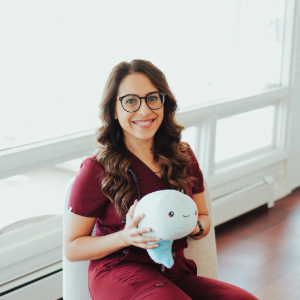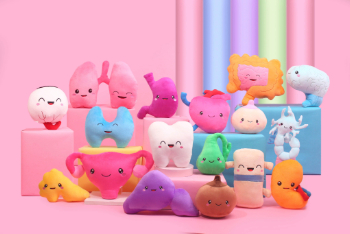
Students in high school and college are often told about the importance of learning to work in groups. The reason, of course, is that many 21st-century jobs demand it.
Even so, it is still possible to go through college and graduate school without ever learning this skill—and often do just fine. There are still many essentially solitary jobs that require minimal interaction with others.
But marketing is not one of them. And because of this, since its inception, the Master’s in Integrated Marketing Communications (IMC) program at Georgetown University has featured a class called Collaboration Lab, which replicates the kind of work that teams of professionals do for their clients. Over several months, students work with a real client, learning everything they can about the brand, its intended market, and its competitors. Then, at the end of the semester, the class presents the client with a detailed plan for moving their product forward.
It's not as easy as it seems, particularly the working together part.
“Students get in the room and say, ‘Of course, we can work together,’” says faculty member Robyn Richardson, who led the class. “Then it starts to get hairy when we do have to work together because a lot of students are used to: ‘I’m going to do my own assignment, and I’m not worried about everybody else.’”

For Spring Semester 2024, the class worked with a one-woman startup called Nerdbugs, which was launched by Madison, Wisconsin, family medicine physician Ronak Mehta, M.D., in 2018. Nerdbugs sells fun, quirky-looking plushies of various body organs—such as hearts, livers, and kidneys—to help educate children about their bodies and provide support for both children and adults facing or recovering from medical procedures.
Connecting with Georgetown
Why “Nerdbugs”?
“Nerdbugs actually comes from a nickname I had for my friends and me back in college and medical school,” Dr. Mehta says. “A bunch of nerdy, overly caffeinated science majors who would pull all-nighters, studying, quizzing each other in the most ridiculous ways, and somehow turn cramming for tests into something fun. When I started this, I wanted a name that captured that same energy, curiosity, learning, and not taking yourself too seriously—and Nerdbugs just stuck.”
Mehta’s business roots go back to when she was in medical school. She started writing fun, whimsical e-books for children about the human body in a kind of Magic School Bus, Dr. Seuss vein. But she always wanted to do more.
“My thought was, ‘Is there something we can create that can make complex medical topics a little bit easier to understand and not so scary?” Mehta recalls. “And how do we make the complex simple and the scary friendly?”
She thought about it for many years before her then-boyfriend, now husband, said she should give it a try, and she founded Nerdbugs and gave it the motto: “Spread Kindness. Stay Nerdy.”

Her Georgetown connection started in 2022, when Mehta answered an online post about Georgetown students who were looking for a small business that they could help as part of a marketing class. At the time, Mehta was having some success selling Nerdbugs to several audiences—doctors, nurses, health educators, and parents—but felt she needed a more comprehensive marketing strategy.
Within five minutes of seeing that post, she submitted a short write-up about her business. Later, she was contacted by Richardson and Faculty Director Wendy Zajack, and floored to learn that the whole class would be working with Nerdbugs for the entire semester.
“I was just blown away to have that kind of opportunity,” Mehta said. “When you’re a small business, you don’t have the resources, generally, to put together a very robust strategy. You kind of just learn what you can on the fly and try your best to kind of make it work. And so, I had a few Zoom calls with Robyn and Wendy, and they were just so kind. And they thought it would be a great fit for Nerdbugs to be involved with the IMC program.”
Understanding a Product and its Potential
After learning more about Nerdbugs, the class of seven did extensive qualitative and quantitative research on the startup and its intended audience, including three surveys that yielded a total of 300 responses and follow-up interviews with selected respondents. The students also interviewed parents, educators, and healthcare and marketing professionals.
The research was designed to understand people’s buying habits, their awareness of the product category, and their specific reactions to Nerdbugs, says program graduate Danielle Hould (G’24). “So, we were able to take that research—and the conversations we had—and come up with a niche for Nerdbugs that can differentiate it from its competitors.”
In its final 27-page report, the class offered three overall recommendations: “lean into Nerdbugs’ kid-friendly identity, create a unique user experience focused on education and community, and position Nerdbugs as a way to help start and guide body-positive conversations for the young and/or squeamish.”
That last recommendation speaks to the deeper goal that has guided Mehta since she began writing those quirky, kid-friendly e-books more than a decade ago.
“The way I see it is that the more you can shed a light on and talk about things that are maybe a little bit uncomfortable or scary, you make them not so scary,” Mehta says. “People fear what they don’t know. And so, if you educate them in a thoughtful way, they can approach it with a sense of curiosity instead of fear, right? And curiosity leads to kindness, and acceptance, and empathy, and all those great values that we hope the generation after us will continue to have.”
Mehta says the class’s recommendations “helped us to step back and rethink how we present Nerdbugs overall and the bigger impact we want to make.”
And, as with any strong educational partnership, the exercise benefited the students as well. For Hould, that included gaining the confidence to lead groups of colleagues with divergent beliefs and ideas.
“You’re a better leader,” her friend and manager for the past 10 years told her after she completed the program. “It’s just transformed you.”
Zajack, the program’s faculty director, recently wrote her doctoral dissertation on the Collaboration Lab and its open-ended approach to problems—and occasional failures.
“So, it’s not just, ‘Okay, your group had a problem. Too bad.’” Zajack says. “It’s really, ‘Okay, what are the things that we could have done? What can we do now?’ and really pushing that dimension, which can be uncomfortable for people, but, in the end, so beneficial: Those are skills you are going to use for the rest of your life.”
